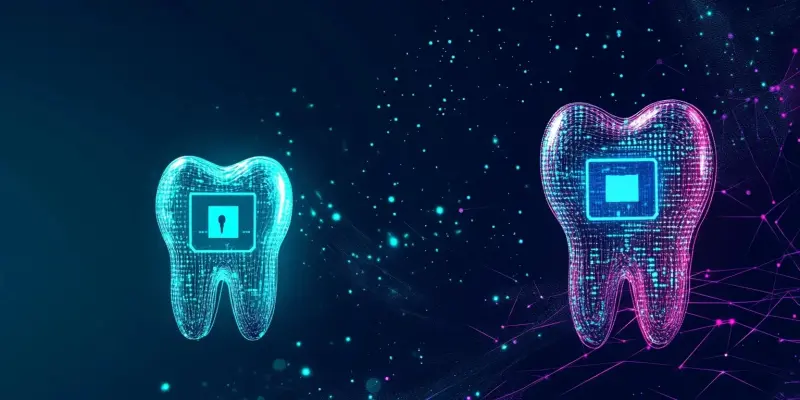The vulnerability of healthcare sectors to cyber-attacks has been a growing concern, with dental practices emerging as frequent targets.The data handled by these entities makes them particularly susceptible to breaches, highlighting the need for enhanced cybersecurity measures. Recent incidents, such as the significant data breach experienced by Chord Specialty Dental Partners, have brought this issue to the forefront.With over 173,400 individuals affected, the breach has exposed sensitive information, prompting legal actions and reinforcing the imperative for robust cybersecurity frameworks.
Current State of Cybersecurity in Dental Practices
Many dental practices have yet to implement robust cybersecurity frameworks.The nature of their work requires handling highly sensitive patient information, such as medical histories and payment details, making the lack of proper security protocols a glaring issue. Despite technological advancements, dental practices often lag behind in adopting state-of-the-art security measures. This lag creates vulnerabilities that cybercriminals eagerly exploit, as evidenced by numerous health data breaches reported to the U.S. Department of Health and Human Services (HHS) in recent years.Practices must recognize the critical need to bridge this gap and invest in advanced security measures.
These shortcomings in cybersecurity are not just about the technology but also about the culture within dental practices. Often, there is insufficient emphasis on the importance of cybersecurity among dental staff, leading to negligent behaviors that can easily be exploited by cyber attackers.Routine training on recognizing and responding to phishing attempts, for example, is still not universally implemented across dental practices. Additionally, the fast-paced nature of clinical environments sometimes results in shortcuts that compromise security.Therefore, addressing these internal attitudes and behaviors is essential for fostering a culture of cybersecurity awareness and vigilance within dental practices.
Consequences of Data Breaches
The ramifications of a data breach extend far beyond immediate financial losses. Affected individuals can experience ongoing emotional distress and anxiety due to the exposure of their personal information.The breach of sensitive data, including Social Security numbers, driver’s license details, and medical histories, can lead to identity theft and long-term financial damage. For dental practices, such breaches not only undermine patient trust but also attract significant legal and regulatory scrutiny. The incident involving Chord Specialty Dental Partners, which led to at least four proposed federal class action lawsuits, highlights the severe legal consequences businesses may face.
These legal actions often involve claims of negligence, with plaintiffs seeking monetary compensation for damages such as monetary losses, lost time, anxiety, and emotional distress. Beyond financial restitution, these lawsuits frequently demand that the affected businesses implement stronger security measures to prevent future breaches.This exposes dental practices to prolonged litigation and potentially substantial settlements, emphasizing the need for preemptive investment in cybersecurity. Such investments are far less costly and disruptive than dealing with the aftermath of a breach.Therefore, it is crucial for dental practices to understand the full spectrum of consequences associated with data breaches and take proactive steps to mitigate these risks.
The Legal and Regulatory Landscape
Healthcare providers, including dental practices, are subject to stringent regulatory requirements like the Health Insurance Portability and Accountability Act (HIPAA), which mandates the protection of patient information. Non-compliance can result in severe penalties, further elevating the financial and reputational risks for dental practices.The increasing frequency of reported breaches is pushing regulators to tighten these requirements. For instance, the HHS’ Office for Civil Rights has been vigilant in monitoring and responding to breaches, resulting in significant penalties for entities that fail to comply with HIPAA regulations.
Moreover, these regulatory bodies are intensifying their oversight and expanding the scope of their audits to ensure that healthcare providers, including dental practices, adhere to the highest standards of data protection. This regulatory pressure compels dental practices to not only comply with existing standards but also stay abreast of evolving regulations.Failing to do so can result in hefty fines, mandatory corrective action plans, and increased scrutiny from regulatory authorities. Therefore, dental practices must prioritize compliance by regularly reviewing and updating their security policies, conducting thorough risk assessments, and ensuring that all staff are adequately trained in data protection protocols.
Importance of Proactive Security Measures
The healthcare sector’s vulnerability to cyber-attacks has been growing, with dental practices increasingly becoming frequent targets.The sensitive data these entities handle makes them particularly susceptible to breaches, underscoring the need for enhanced cybersecurity measures. A recent significant incident involved a data breach at Chord Specialty Dental Partners, bringing this issue sharply into focus. This breach, which affected over 173,400 individuals, exposed a vast amount of sensitive information.The fallout from this event has included legal actions and has served as a stark reminder of the critical need for robust cybersecurity frameworks in the healthcare sector. Dental practices, in particular, must invest in comprehensive cybersecurity strategies to safeguard patient data and maintain trust.The increasing frequency of such breaches highlights the urgent need for the healthcare sector to prioritize cyber defense mechanisms, protecting against potential threats that could compromise the confidentiality, integrity, and availability of patient information.

